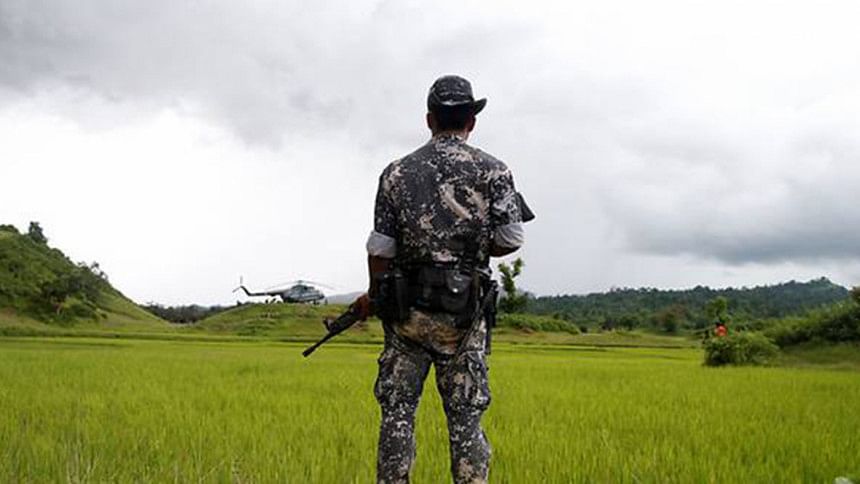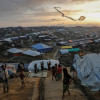Myanmar replaces general in charge of Rakhine

Myanmar's army has replaced the general in charge of Rakhine state following a military crackdown that has driven more than 600,000 Rohingya Muslims into neighbouring Bangladesh amid reports of mass rape, torture and other crimes against humanity.
No reason was given for Major General Maung Maung Soe being transferred from his post as the head of Western Command in Rakhine, where Myanmar's military, known as the Tatmadaw, launched a sweeping counter-insurgency operation in August.
"I don't know the reason why he was transferred," Major General Aye Lwin, deputy director of the psychological warfare and public relation department at the Ministry of Defence, told Reuters. "He wasn't moved into any position at present. He has been put in reserve."
The move comes ahead of a visit on Wednesday by US Secretary of State Rex Tillerson who is expected to deliver a stern message to Myanmar's generals, over whom national leader Aung San Suu Kyi, criticized in the West for failing to halt the atrocities, has little control.
Senators in Washington are pressing to pass legislation imposing economic and travel sanctions targeting the military and its business interests.
The government in mostly-Buddhist Myanmar regards the Rohingya as illegal immigrants from Bangladesh.
Leaders of Asian nations meeting in Manila on Monday skirted around the mass exodus of the Rohingya, disappointing human rights groups who were hoping for a tough stand.
Maung Maung Soe's transfer was ordered on Friday and Brigadier General Soe Tint Naing, formerly a director in logistics, had been appointed as the new head of Western Command.
Made up of three divisions, Western Command is overseen by the Bureau of Special Operations, which reports to the office of the Commander in Chief of the military, Senior General Min Aung Hlaing.
A senior UN official has described the army's actions in Rakhine as a textbook example of ethnic cleansing. Myanmar says the clearance operation was necessary for national security after Rohingya militants attacked 30 security posts and an army base in the state on August 25.
ALLEGED ATROCITIES
On Sunday, another UN official accused Myanmar's military of conducting organized rape and other crimes against humanity, and said she would raise the matter with the International Criminal Court in the Hague.
"When I return to New York, I will brief and raise the issue with the prosecutor and president of the ICC whether they (Myanmar's military) can be held responsible for these atrocities," Pramila Patten, Special Representative of the Secretary-General on Sexual Violence in Conflict, said in Dhaka.
"Sexual violence is being commanded, orchestrated and perpetrated by the Armed Forces of Myanmar, otherwise known as the Tatmadaw," Patten said following a three-day tour of the Rohingya refugee camps in the Cox's Bazar region of Bangladesh.
"Rape is an act and a weapon of genocide," she said.
Refugees have accused Myanmar soldiers and Buddhist vigilantes of torching their villages, murdering their families and raping women.
Patten said brutal acts of sexual violence had occurred in the context of collective persecution that included the killing of adults and children, torture, mutilation and the burning and looting of villages.
"The forms of sexual violence we consistently heard about from survivors include gang-rape by multiple soldiers, forced public nudity and humiliation, and sexual slavery in military captivity. One survivor was in captivity for 45 days by the Myanmar army," Patten said.
INTERNAL PROBE
Myanmar's military said in October that an internal probe was being held into the conduct of its soldiers during the counteroffensive in Rakhine.
But Myanmar is refusing entry to a UN panel that was tasked with investigating allegations of abuses after a smaller military counteroffensive launched in October 2016.
Myanmar is in the early stages of a fragile transition to democracy after being ruled by a junta for 49 years, and the generals have retained their autonomy on matters of defense, security and border issues under a 2008 constitution, and three generals are members of the cabinet.
Suu Kyi has said that any alleged atrocities should be substantiated and investigated, while her government is working to stabilize Rakhine in order for the Rohingya to return.
For now, though, the flow is one way. International Rescue Committee, the New York-based aid agency, reckons that around two-thirds of an estimated 300,000 Rohingya remaining in Myanmar could head across the border in the coming months.

 For all latest news, follow The Daily Star's Google News channel.
For all latest news, follow The Daily Star's Google News channel. 








Comments